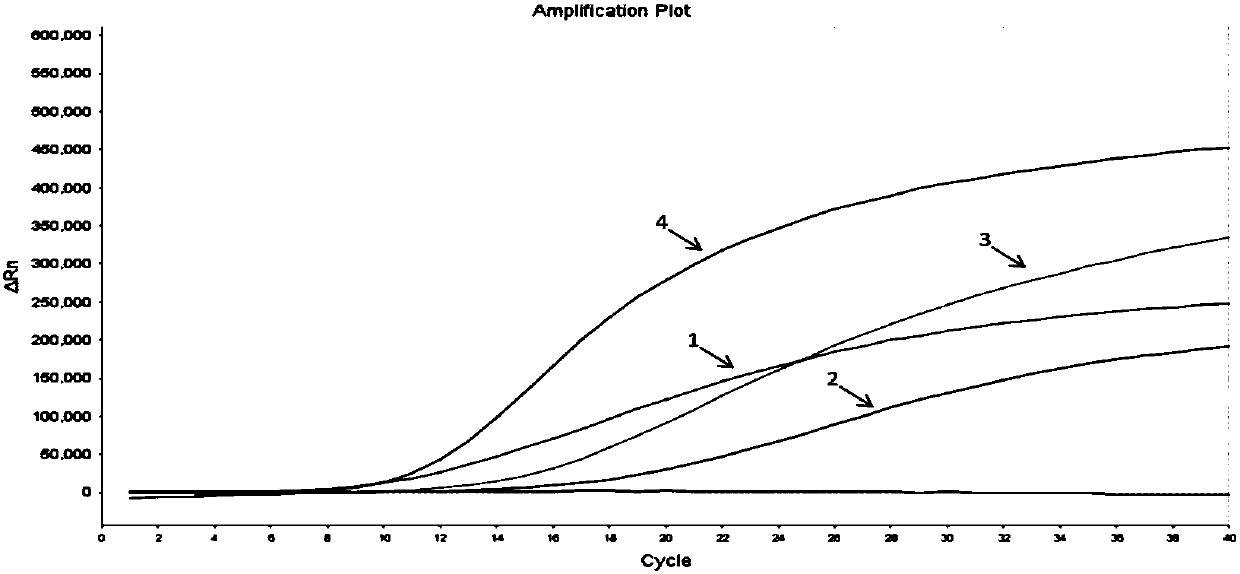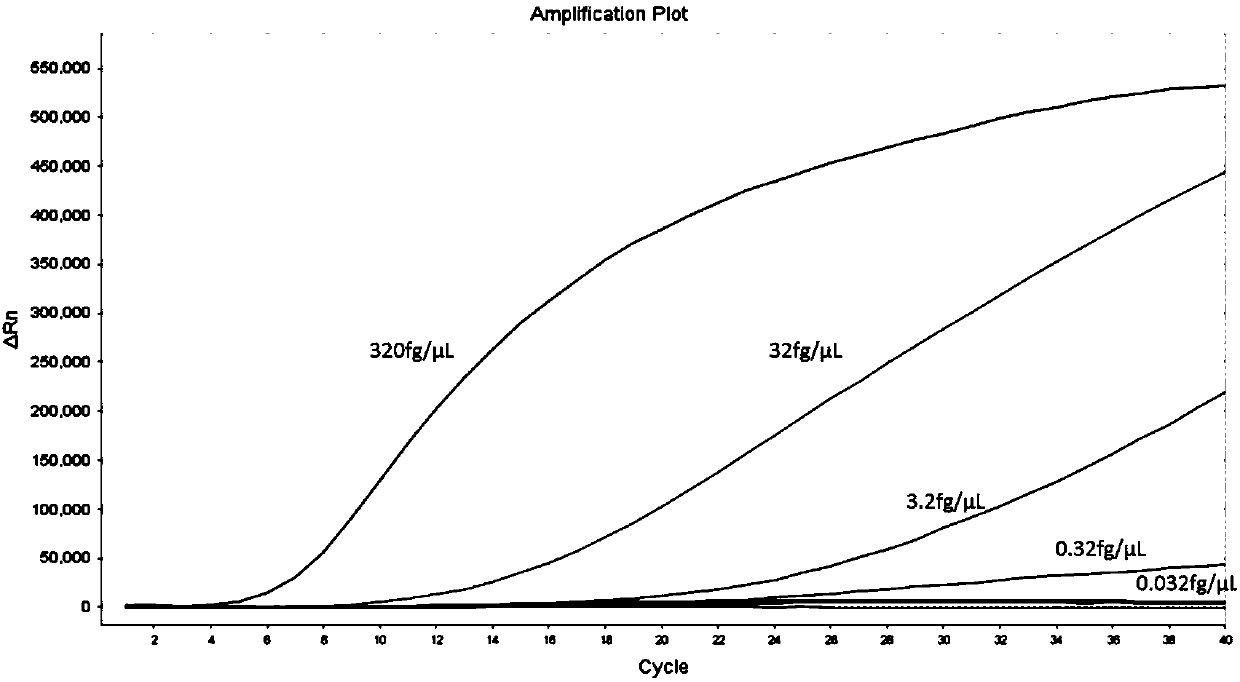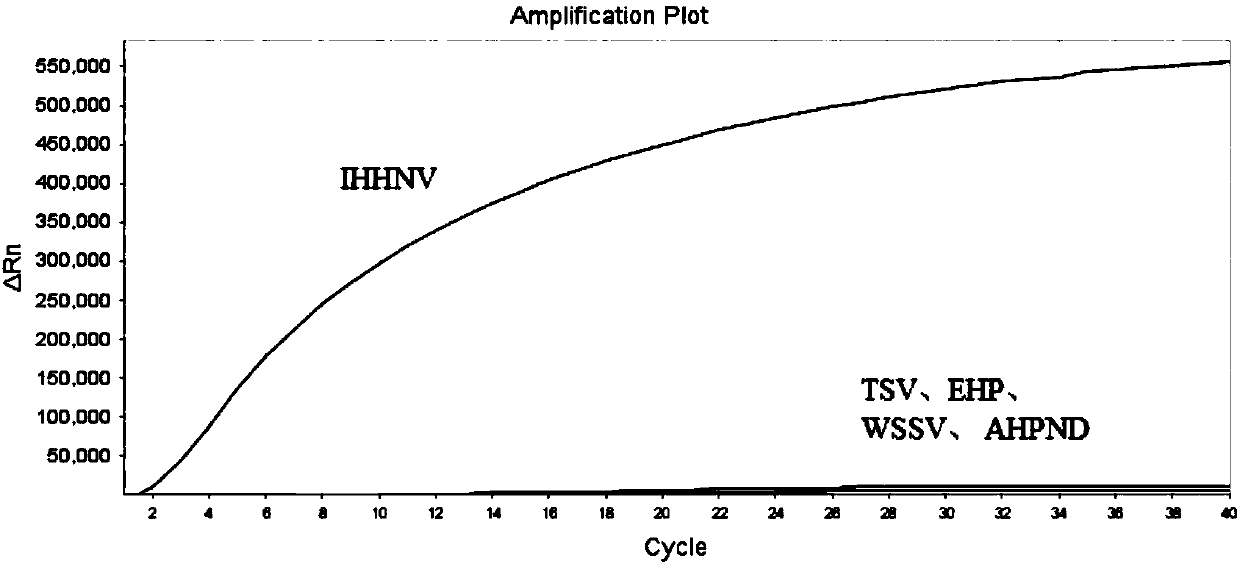Recombinase-aid amplification (RAA) thermostatic fluorescence detection method of infectious hypodermal and hematopoietic necrosis virus (IHHNV), and reagent
A technology for hematopoietic tissue and necrotic virus, applied in the field of molecular biology, can solve the problems of low detection sensitivity, limited application, complicated operation, etc., and achieve the effects of high sensitivity, simple identification and simple operation.
- Summary
- Abstract
- Description
- Claims
- Application Information
AI Technical Summary
Problems solved by technology
Method used
Image
Examples
Embodiment 1
[0029]The present invention searches the gene sequence of the infectious subcutaneous and hematopoietic tissue necrosis virus of prawns in the Genebank database, uses DNAMAN 6.0 software to compare multiple sequences, and finds the conserved segment. Four sets of primers and probes were designed in the conserved regions, and BLAST comparison was performed in the NCBI database. The sequences of the primers and probes are shown in Table 1. The positive sample amplification curve is as follows figure 1 shown.
[0030] Table 1 primers and probe sequences:
[0031]
[0032] Depend on figure 1 The results show that the amplification curves of the fourth group of primers and probes are the most typical, with obvious exponential phase and plateau phase, higher fluorescence intensity (ordinate value), and smaller CT value (the intersection of the curve and the threshold line Corresponding abscissa) result analysis is shown in Table 2. For other primers and probes, the rising hei...
example 3
[0044] Example 3: Kit of the present invention Enterococcus hepatica
[0045] 1. Extraction of sample nucleic acid
[0046] 1.1. Nucleic acid extraction: DNA extraction was performed using a marine animal tissue DNA extraction kit.
[0047] 2. The configuration of the RAA reaction system: each test sample corresponds to a RAA reaction dry powder tube, and the reaction components and the added volume in each RAA reaction dry powder tube are shown in Table 3.
[0048] table 3:
[0049] RAA reaction system components
Volume (μL)
A Buffer
12.5μL
B Buffer
2.5μL
primer mix
4μL
specific fluorescent probe
0.6μL
DNA template
2μL
wxya 2 o
28.4μL
total capacity
50μL
[0050] A Buffer is 20% PEG; B Buffer is 280mM MgAc
[0051] 3. Place the RAA reaction tube with the reaction system in the ABI7500 amplification instrument, and perform RAA amplification according to the following procedure: ...
Embodiment 4
[0054] Embodiment 4: Evaluation of the RAA detection kit of the present invention in clinical practice
[0055] The kit of the present invention is used to carry out a clinical blind sample experiment, and 500 prawns are detected; the experimental results show that the fourth primer pair of the present invention can distinguish Hepatocystis prawns, and the positive coincidence rate with nested PCR is very high. Among the 500 copies of nested PCR, 345 were positive results, 155 were negative results, 346 were positive by the RAA method, 154 were also negative results, and one positive result was different. The sample DNA was amplified by PCR and sequenced, and the sequencing result showed that the sample was positive, indicating that the RAA detection reagent of the present invention has a higher accuracy rate.
PUM
 Login to View More
Login to View More Abstract
Description
Claims
Application Information
 Login to View More
Login to View More - Generate Ideas
- Intellectual Property
- Life Sciences
- Materials
- Tech Scout
- Unparalleled Data Quality
- Higher Quality Content
- 60% Fewer Hallucinations
Browse by: Latest US Patents, China's latest patents, Technical Efficacy Thesaurus, Application Domain, Technology Topic, Popular Technical Reports.
© 2025 PatSnap. All rights reserved.Legal|Privacy policy|Modern Slavery Act Transparency Statement|Sitemap|About US| Contact US: help@patsnap.com



